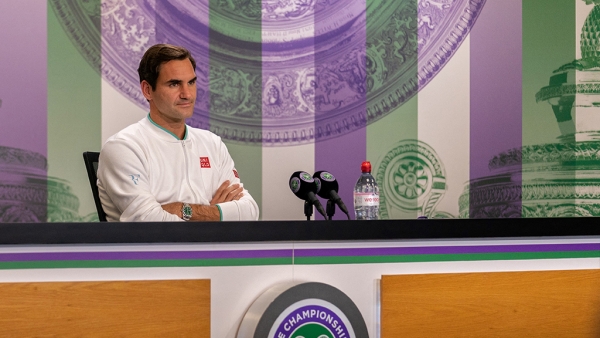Roger Federer’s straight-sets loss to Hubert Hurkacz in Wednesday’s Wimbledon quarterfinals left the Swiss uncertain about the next stage in his comeback from knee surgery.
On one hand, reaching the last eight at a Grand Slam tournament despite such limited match play might inspire confidence and optimism. On the other, the fact he was comprehensively outplayed once at that stage left Federer, in his own words, “very disappointed in the moment”.
Just a month out from his 40th birthday, Federer’s departure from Centre Court and acknowledgment of the crowd – which gave him a rapturous standing ovation – led some to speculate whether or not this would be his last visit to the All England Club.
REPORT: Hurkacz stuns Federer to reach Wimbledon semis
“I really don't know,” he answered.
“I've got to regroup. My goal was always for the last year and more to always try to play another Wimbledon. I was able to make it this year, which I'm really happy about.
“I'm actually very happy I made it as far as I did here and I actually was able to play Wimbledon at the level that I did after everything I went through.
“Of course I would like to play it again, but at my age you're just never sure what's around the corner.”

Federer is not accustomed to being in such an uncertain position.
The last time he was sidelined for a lengthy period following knee surgery, he swept to the Australian Open 2017 title having not played competitively for six months.
Granted, that was more than four years ago; nevertheless, rehabilitation this time was far more challenging.
“The process was incredibly slow. I was hoping for faster recovery, to be honest,” he lamented. “The goal was to compete already for Wimbledon last year. I barely made it sort of for this year.”
The last time he suffered a 6-0 set loss was 13 years ago, in the Roland Garros final against Rafael Nadal. It is something he has never experienced at Wimbledon.
“It was tough. The last few games obviously as you can feel that you're not coming back from it,” he said. “Crowds were amazing. The ovation is fantastic. Unfortunately they witnessed a straight-sets defeat of mine.”
And it has been a while since Federer could not rely on his timing, feel and instinctively free-flowing game; from 4-1 up in the second set, he lost 12 of the final 14 games to Hurkacz.
“Clearly there's still a lot of things missing in my game that maybe 10, 15, 20 years ago were very simple and very normal for me to do. Nowadays they don't happen naturally anymore,” Federer admitted.
“I have a lot of ideas on the court, but sometimes I can't do what I want to do.”
All of these uncertainties mean Federer does not yet know what his next move will be.
He is yet to commit to the Tokyo Olympics, and could not offer any concrete details about how his upcoming schedule would look.
“With everything that comes after Wimbledon, we were always going to sit down and talk about it. I got to take a few days," he said.
“Now that that's over, you just got to reassess everything. What went well, what didn't go so well, where is the body, where is the knee, where is the mind.
“It was a struggle for me and putting in extra effort all the time, especially when things get difficult against Felix (Auger-Aliassime) in Halle or today against Hurkacz. I definitely need to be a better player if I want to be more competitive at the highest of levels.
“I knew it was going to be really hard, to be honest. Now I just got to talk to the team, take my time, not feel rushed by you guys (the media) or anybody else.
“That's where it leaves me. But, no, I hope not that (retirement is) going to happen. The goal is to play, of course.”